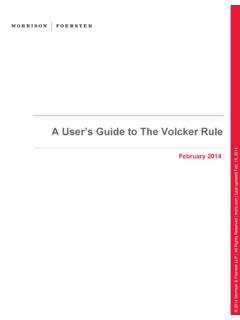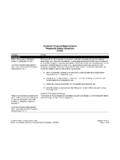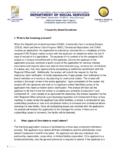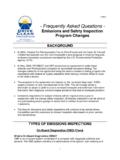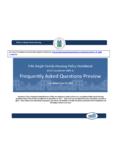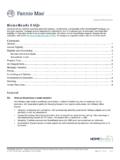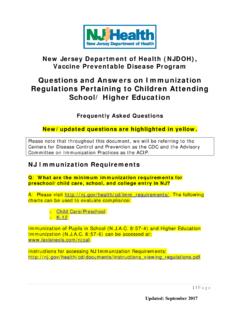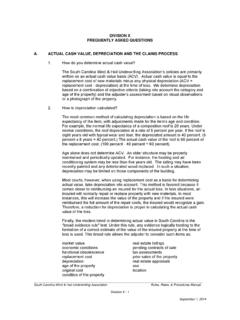Transcription of Frequently Asked Questions about Rule 144A - …
1 F R E Q U E N T L Y A S K E D Q U E S T I O N S A B O U T R U L E 1 4 4 A Understanding Rule 144A What is Rule 144A? Rule 144A is a safe harbor exemption from the registration requirements of Section 5 of the Securities Act for certain offers and sales of qualifying securities by certain persons other than the issuer of the securities. The exemption applies to resales of securities to qualified institutional buyers, who are commonly referred to as QIBs. QIBs must be institutions, and cannot be individuals no matter how wealthy or sophisticated. See What is a QIB ? The securities eligible for resale under Rule 144A are securities of and foreign issuers that are not listed on a securities exchange or quoted on a automated inter-dealer quotation system.
2 Rule 144A provides that reoffers and resales in compliance with the rule are not distributions and that the reseller is therefore not an underwriter within the meaning of Section 2(a)(11) of the Securities Act. A reseller that is not the issuer, an underwriter, or a dealer can rely on the exemption provided by Section 4(a)(1) of the Securities Act. Resellers that are dealers can rely on the exemption provided by Section 4(a)(3) of the Securities Act. See Who may rely on Rule 144A? Who may rely on Rule 144A? Any person other than an issuer may rely on Rule 144A. Issuers must find another exemption for the offer and sale of unregistered securities. Typically they rely on Section 4(a)(2) (often in reliance on Regulation D) or Regulation S under the Securities Act.
3 Affiliates of the issuer may rely on Rule 144A. See Preliminary Note No. 7 to Rule 144A and SEC Compliance and Disclosure Interpretations, Securities Act rules , question (Jan. 26, 2009), available at What types of transactions are conducted under Rule 144A? The following types of transactions often are conducted under Rule 144A: offerings of debt or preferred securities by public companies; offerings by foreign issuers that do not want to become subject to reporting requirements ; and offerings of common securities by non-reporting issuers ( , backdoor IPOs ). (See our Frequently Asked Questions about Rule 144A Equity Offerings, available at 2 , for additional information.)
4 An issuer that intends to engage in multiple offerings may have a Rule 144A program. Rule 144A programs are programs established for offering securities (usually debt securities) on an ongoing or continuous basis to potential offerees. They are similar to medium-term note programs, but they are unregistered, and the securities are sold only to QIBs. These programs often are used by financial institution and insurance company issuers to offer securities, through one or more broker-dealers, to institutional investors in continuous offerings. Among the advantages of using Rule 144A programs are (1) no required public disclosure of innovative structures or sensitive information; (2) limited FINRA filing requirements ; and (3) reduced potential for liability under the Securities Act.
5 What are the conditions that a reseller of restricted securities must satisfy to rely on Rule 144A? There are four conditions to reliance on Rule 144A: The resale is made only to QIBs (see What is a QIB ? below) or to a purchaser that the reseller (and any person acting on its behalf) reasonably believes is a QIB (see How does a reseller establish a reasonable belief that a person is a QIB? ); The reseller (or any person acting on its behalf) must take reasonable steps to ensure that the buyer is aware that the reseller may rely on Rule 144A in connection with the resale (see Reseller s Reasonable Steps So Buyer is Aware of Rule 144A Reliance below); The securities reoffered or resold (a) when issued were not of the same class as securities listed on a national securities exchange (which includes the NASDAQ Market System) or quoted on a automated inter-dealer quotation system).
6 And (b) are not securities of an open-end investment company, unit investment trust, or face-amount certificate company that is, or is required to be, registered under the Investment Company Act of 1940; and In the case of securities of an issuer that is neither an Exchange Act reporting company, or a foreign issuer exempt from reporting pursuant to Rule 12g3-2(b) of the Exchange Act, or a foreign government, the holder and a prospective buyer designated by the holder must have the right to obtain from the issuer and must receive, upon request, certain reasonably current information about the issuer. See Informational requirements .
7 Source: Rule 144A(d). Must a reseller of restricted securities rely only on Rule 144A in making exempt resales? No; Rule 144A is a non-exclusive safe harbor. A reseller may rely upon any applicable exemption from the registration requirements of the Securities Act in connection with the resale of restricted securities. In addition, Rule 144A offerings often are effected side-by-side with an offering targeted at foreign holders in reliance on Regulation S. This permits an issuer to effect a multinational offering with a QIB tranche and a Regulation S tranche, and to sell to an initial purchaser outside the United States in reliance on Regulation S, 3 even though the initial purchaser contemplates the immediate resale to QIBs in reliance on Rule 144A.
8 Typically, resellers that cannot rely on the safe harbor under Rule 144A will attempt to rely on the hybrid Section 4(a)(1 ) exemption. See What is the Section 4(a)(1 ) exemption? In addition, the holder of securities purchased under Rule 144A may rely on the provisions of Rule 144 to sell those securities. Are securities resold under Rule 144A freely tradable after such resale? No. Securities acquired in a Rule 144A transaction are deemed to be restricted securities within the meaning of Rule 144(a)(3) of the Securities Act. As a result, these securities remain restricted until the applicable holding period expires and may only be publicly resold under Rule 144, pursuant to an effective registration statement, or in reliance on any other available exemption under the Securities Act.
9 Exempt resales of restricted securities may be made in compliance with Rule 144A, the so-called Section 4(a)(1 ) exemption, Section 4(a)(7) or Regulation S. See The Section 4(a)(1 ) Exemption and Section 4(a)(7). Source: Preliminary Note No. 6 of Rule 144A. What are the holding periods applicable to the sale of Rule 144A and other restricted securities? In December 2007, the SEC amended Rule 144, effective February 2008, to, among other things, shorten the holding periods for restricted securities (subject to certain public information requirements ). For non-affiliate holders of restricted securities, Rule 144 provides a safe harbor for the resale of such securities without limitation after six months in the case of issuers that are reporting companies that comply with the current information requirements of Rule 144(c), and after one year in the case of non-reporting issuers.
10 (Prior to the December 2007 amendments, the holding period was one year.) In each case, after a one-year holding period, resales of these securities by non-affiliates will no longer be subject to any other conditions under Rule 144. For a reporting issuer, compliance with the adequate current public information condition requires the issuer to have filed all required reports under Section 13 or Section 15(d) of the Exchange Act. For a non-reporting issuer, compliance with the adequate current public information condition requires the public availability of basic information about the issuer, including certain financial statements. For affiliate holders of restricted securities, Rule 144 provides a safe harbor permitting resales of restricted securities, subject to the same six-month and one-year holding periods for non-affiliates and to other resale conditions of amended Rule 144.


